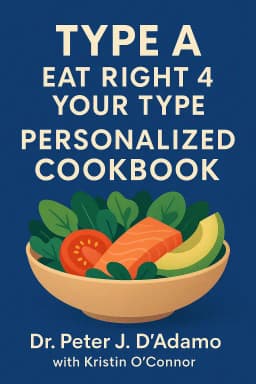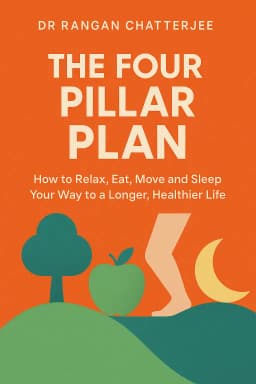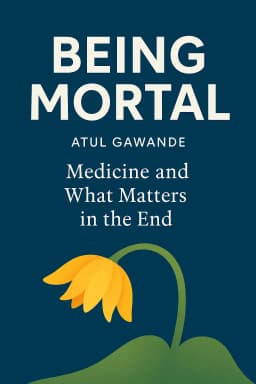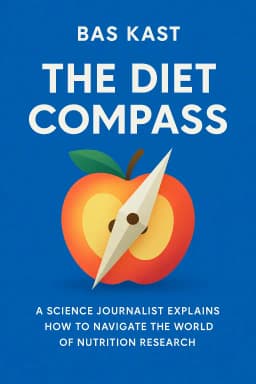
Personalized Podcast
Golden Hook & Introduction
SECTION
Orion: What if the secret to living to 100 wasn't some high-tech pill or a billion-dollar gene therapy, but a simple mindset? Imagine being asked for your secret to a long life, and your answer is this: "Do not be jealous or angry, take walks, do not stress about life, and live in gratitude." That's the actual advice from a woman named Giulia Pisanau, who lived to be over 100 years old in Sardinia.
eck: That’s incredible. It’s so simple it’s almost revolutionary. We spend so much time and energy trying to find complex solutions, buying expensive supplements, tracking every single calorie. And her advice is… to manage your inner world. It’s profound.
Orion: It is. And that's the central question in Dr. Mark Hyman's fascinating book, 'Young Forever,' and it's what we're exploring today. He argues that aging itself is not an inevitable decline, but a treatable disease. And the "treatment" is this amazing blend of ancient wisdom and cutting-edge science.
eck: I love that framing. It’s not about fighting a losing battle against time, but actively participating in our own health story.
Orion: Exactly. So today, we'll dive deep into this from two perspectives. First, we'll explore the historical blueprints for longevity found in the world's Blue Zones—these pockets of the world where people seem to have forgotten to die. Then, we'll discuss the cutting-edge science of hormesis, and how you can press your body's own 'cellular reset' button.
eck: So, we’re looking at the old-school software and the new-school hardware for a longer, healthier life. I'm in.
Deep Dive into Core Topic 1: The Ancient Blueprint: Lessons from the Blue Zones
SECTION
Orion: Perfect. So, Hyman takes us to these places he calls 'Blue Zones' to find these blueprints. These are regions like Ikaria in Greece, Okinawa in Japan, and Sardinia in Italy, where people have an unusually high concentration of centenarians. Let's start in the mountains of Sardinia, where Hyman met a shepherd named Carmine.
eck: A shepherd. Already this sounds more like a historical novel than a health book.
Orion: It really does. Carmine is 84 years old, but Hyman describes him as effortlessly hiking up and down the mountainside to tend his sheep, his goat, his chickens. He lives a life of profound simplicity. He’s been on this same land since 1989. He grows his own vegetables, tends his olive orchards—one tree is 300 years old. He lost his wife a few years back, but he lives with his sister and her daughters. He’s deeply embedded in his family and community.
eck: So his life is his gym. The work he does, the food he eats, the people he’s with—it’s all one integrated system. It's not compartmentalized like our lives, where we work, then we go to the gym, then we schedule social time.
Orion: That's the key insight. And it’s not just physical. Hyman spent three hours just chatting with Carmine, about everything from his farm to God and climate change. The man has a deeply curious and engaged mind. He’s not just physically active; he’s mentally and socially active.
eck: That resonates so much with what I find fascinating about historical figures. You look at someone like George Washington. We think of him as a general and a president, but he was a farmer and a surveyor first. His work was his workout. He was constantly moving, engaging with the land, solving complex problems. That kind of integrated, purposeful life seems to be a common thread for resilience, whether you're a founding father or a Sardinian shepherd.
Orion: A perfect parallel. And it’s the same with Giulia Pisanau, the 100-year-old woman we started with. Hyman visits her, and she shares stories of her childhood, growing up in poverty after World War I. Her life was hard. She never married, worked for a family for decades. But now, at 100, she spends her time doing embroidery, walking, and socializing. She keeps her mind sharp with crossword puzzles.
eck: And what were her secrets again? The ones you mentioned at the start?
Orion: "Do not be jealous or angry, take walks, do not stress about life, and live in gratitude."
eck: See, that’s what gets me. None of those are about a specific diet or a supplement. They're all internal states. They’re about managing your emotional and psychological landscape. That feels like the real core of motivation. It’s not about forcing yourself to do something you hate; it’s about cultivating a state of being that is inherently healthy and low-stress.
Orion: Hyman argues that’s exactly it. He says these communities show us that genetics are only about 20% of the equation. The other 80% is lifestyle—but not just diet and exercise. It’s purpose, it’s community, it’s this low-stress, grateful outlook. They built a life that naturally supports longevity, without even thinking about it.
eck: They created an environment, both internal and external, where the default option is health. We’ve created an environment where the default is convenience, which often leads to poor health. We have to actively fight our environment, whereas theirs just… works.
Orion: And that’s the perfect transition. Because if their environment provided these natural, beneficial stresses that kept them young, what can we do in our modern, convenient world? This brings us to our second idea: a biological concept called hormesis.
Deep Dive into Core Topic 2: The Cellular Reset Button: Hacking Longevity with Hormesis
SECTION
eck: Hormesis. Okay, that sounds very scientific. Break it down for me.
Orion: It’s a fascinating idea, and it’s the science behind the old saying, "what doesn't kill you makes you stronger." Hormesis is when your body is exposed to a small, controlled dose of a stressor—not enough to cause real harm, but enough to kick your innate survival and repair systems into high gear. It’s like a biological fire drill. Your cells panic a little, and in response, they clean house, repair DNA, and build stronger defenses.
eck: So you’re intentionally creating a small, manageable 'threat' to force your body to upgrade its own defensive software.
Orion: Precisely. And many of the things we intuitively know are good for us are actually hormetic stressors. Exercise is the classic example. You stress your muscles and cardiovascular system, and they respond by getting stronger. But Hyman points to other, less obvious examples. Let’s take heat. There was a huge, 20-year study in Finland on over 2,000 men who regularly used saunas.
eck: A very Finnish study. I love it.
Orion: Right? They found that the men who used a sauna two to three times a week had a 24 percent lower risk of death from any cause compared to those who went just once a week. But get this—the guys who went four to seven times a week? They had a 40 percent reduction in death. The heat is a hormetic stress that forces the body to produce something called 'heat shock proteins,' which are like a cellular repair crew that fixes damaged proteins.
eck: That’s amazing. So a cultural, historical tradition is basically a widespread, unconscious longevity practice. It makes me think about the custom theme we discussed, '换手机' (huàn shǒujī), which means changing your phone. The old one might be working fine, but when you get a new one, or even just a major software update, it forces all the systems to recalibrate and run more efficiently. A sauna session is like forcing a system-wide software update on your own body.
Orion: That is the perfect metaphor. You're triggering an upgrade. And the science is getting even more direct. A groundbreaking study at Tel Aviv University took this to the next level with something called hyperbaric oxygen therapy, or HBOT. They put a group of people over the age of 64 in a chamber with 100% oxygen at high pressure for 60 sessions over three months.
eck: That sounds intense. What happened?
Orion: The results were stunning. It didn't just slow down aging; it measurably reversed it on a cellular level. The therapy cleared out senescent cells—they call them 'zombie cells' that hang around and cause inflammation. And even more incredibly, it actually lengthened their telomeres. Telomeres are the protective caps at the ends of our DNA, and they naturally shorten as we age. It's one of the key hallmarks of aging. This therapy made them longer. Their biological age went backward.
eck: Wow. Okay, so that’s the 'new phone' in your metaphor. A complete hardware and software overhaul. It’s mind-blowing to think about. So, the Sardinian shepherd gets his hormetic stress from hiking up a mountain every day, a Finnish man gets it from a sauna, and now we can get it from a high-tech oxygen chamber.
Orion: Exactly. They are all different inputs that trigger the same ancient, powerful healing response. The Blue Zone residents had it built into their lives. We've engineered it out of our lives, so now we have to consciously engineer it back in. Whether it's through a cold plunge, intermittent fasting, or intense exercise, we're just finding modern, accessible ways to replicate the beneficial stresses that were once a natural part of being human.
eck: It reframes the whole idea of motivation. It’s not just about willpower to go to the gym. It’s about understanding that you’re engaging in a deep, biological conversation with your own body. You’re giving it a signal, and it’s responding by making you stronger. That’s a much more compelling reason to get moving than just 'burning calories.'
Orion: It’s about working with your biology, not against it. You’re tapping into a system that’s been perfected over millions of years.
Synthesis & Takeaways
SECTION
eck: So, when you put it all together, it’s a really powerful two-part message. First, we can look to history and these Blue Zone communities for the 'what'—the principles of a long, healthy life are timeless. Purpose, real food, natural movement, community.
Orion: The 'software,' as you put it. And then, we have the science of hormesis, which is the 'how.' It explains the mechanism. It gives us a toolkit to activate that same powerful, health-promoting software, even in our crazy, modern world. We can use heat, cold, exercise, and even oxygen to send our bodies the signal to repair and rejuvenate.
eck: It feels empowering. It takes aging from a passive process that happens to you, to an active one you can influence. It’s not about a guarantee of living to 150, but about improving the quality of the years you do have—your health span.
Orion: That’s the core of the book. It’s not just about adding years to your life, but life to your years. So, as we wrap up, what’s the big takeaway for you, eck?
eck: For me, it’s not about becoming a biohacker overnight or building a sauna in my apartment. It’s about embracing curiosity. The book makes you ask, "What's one small, positive stress I can add to my life?" It’s a small experiment. Maybe it’s ending my morning shower with just 30 seconds of cold water. Or maybe it’s taking a walk and intentionally leaving my phone at home, to give my brain a different kind of stimulation.
Orion: I love that. It’s about starting a conversation with your own biology.
eck: Exactly. It’s about asking your body a question with a new experience and then listening to the answer. That feels like a sustainable, and frankly, much more interesting way to approach health than just following a rigid set of rules. It’s about staying curious, forever.









